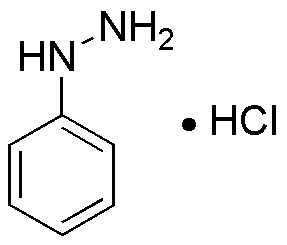Phenylhydrazine hydrochloride is widely utilized in research focused on:
- Synthesis of Pharmaceuticals: This compound is crucial in the synthesis of various pharmaceutical agents, particularly in the development of anti-cancer drugs and other therapeutic agents.
- Analytical Chemistry: It serves as a reagent in analytical chemistry for the detection and quantification of carbonyl compounds, making it valuable in quality control processes in the food and pharmaceutical industries.
- Biochemical Research: Researchers use it to study enzyme kinetics and protein interactions, providing insights into metabolic pathways and disease mechanisms.
- Polymer Chemistry: It plays a role in the production of hydrazone polymers, which can be used in coatings and adhesives, offering enhanced durability and performance.
- Laboratory Reagent: As a versatile reagent, it is employed in various organic synthesis reactions, allowing chemists to create complex molecules efficiently.
General Information
Properties
Safety and Regulations
Applications
Phenylhydrazine hydrochloride is widely utilized in research focused on:
- Synthesis of Pharmaceuticals: This compound is crucial in the synthesis of various pharmaceutical agents, particularly in the development of anti-cancer drugs and other therapeutic agents.
- Analytical Chemistry: It serves as a reagent in analytical chemistry for the detection and quantification of carbonyl compounds, making it valuable in quality control processes in the food and pharmaceutical industries.
- Biochemical Research: Researchers use it to study enzyme kinetics and protein interactions, providing insights into metabolic pathways and disease mechanisms.
- Polymer Chemistry: It plays a role in the production of hydrazone polymers, which can be used in coatings and adhesives, offering enhanced durability and performance.
- Laboratory Reagent: As a versatile reagent, it is employed in various organic synthesis reactions, allowing chemists to create complex molecules efficiently.
Documents
Safety Data Sheets (SDS)
The SDS provides comprehensive safety information on handling, storage, and disposal of the product.
Product Specification (PS)
The PS provides a comprehensive breakdown of the product’s properties, including chemical composition, physical state, purity, and storage requirements. It also details acceptable quality ranges and the product's intended applications.
Certificates of Analysis (COA)
Search for Certificates of Analysis (COA) by entering the products Lot Number. Lot and Batch Numbers can be found on a product’s label following the words ‘Lot’ or ‘Batch’.
*Catalog Number
*Lot Number
Certificates Of Origin (COO)
This COO confirms the country where the product was manufactured, and also details the materials and components used in it and whether it is derived from natural, synthetic, or other specific sources. This certificate may be required for customs, trade, and regulatory compliance.
*Catalog Number
*Lot Number
Safety Data Sheets (SDS)
The SDS provides comprehensive safety information on handling, storage, and disposal of the product.
DownloadProduct Specification (PS)
The PS provides a comprehensive breakdown of the product’s properties, including chemical composition, physical state, purity, and storage requirements. It also details acceptable quality ranges and the product's intended applications.
DownloadCertificates of Analysis (COA)
Search for Certificates of Analysis (COA) by entering the products Lot Number. Lot and Batch Numbers can be found on a product’s label following the words ‘Lot’ or ‘Batch’.
*Catalog Number
*Lot Number
Certificates Of Origin (COO)
This COO confirms the country where the product was manufactured, and also details the materials and components used in it and whether it is derived from natural, synthetic, or other specific sources. This certificate may be required for customs, trade, and regulatory compliance.


